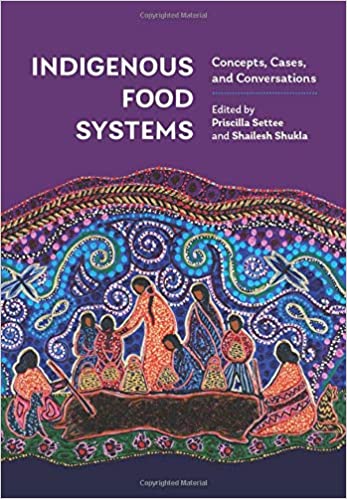Throughout my career in the academic world, I have been fortunate to explore and learn
about food experiences in Indigenous communities in Canada and other parts of the
world. As founding director of the Centre for Indigenous Peoples’ Nutrition and Environment
(CINE) at McGill University, I have been introduced to many Indigenous
leaders, scholars, and community activists who shared their concerns and vision for better,
healthier lives by being able to take greater advantage of their traditional knowledge
about their cultural foods. It is universally recognized that traditional food provides
more than the essential physical sustenance; it also provides extensive social and cultural
values for communities.
Indigenous cultures are known to hold traditional values for the protection, care,
and nurture of their families and for the natural world. Indigenous food systems give
sustenance tied to land and territories and to identity, way of life, and spirituality. Knowledge
of a vast array of plant and animal species exists in Indigenous communities and
territories that maintained sustainable food systems generated from holistic approaches
to food that do not deplete the natural resource base with the intent of commercialization.
Indigenous Peoples view their food systems as coexisting with other living beings
in these territories, as being connected to maintain equilibrium and avoid exploitation.
Unfortunately, the rapidly changing economic and socio-cultural circumstances that
Indigenous Peoples face lead to less use and transfer of food knowledge and traditions to
next generations, and this in turn leads to eroding food security and health.
Many Indigenous Peoples live in ecosystems that face environmental and sociocultural
threats, which results in loss of countless unique and excellent foods and the
dietary patterns that sustained Indigenous cultures for thousands of years. Indigenous
food systems need to be understood and valorized in an increasingly globalized world,
where industrialization results in extensive processed and packaged commercial foods
that are often of limited nutritional value. This creates communities of Indigenous
Peoples today who often experience poverty accompanied by nutrient deficiencies and
chronic diseases who intuitively recognize that the traditional cultural foods they can
no longer access are often superior to the market foods they cannot afford. This creates
the unfortunate erosion of food sovereignty as the major contributor to food insecurity.
چکیده فارسی
در طول زندگی حرفه ای خود در دنیای آکادمیک، من خوش شانس بوده ام که کشف و یاد بگیرم
در مورد تجربیات غذایی در جوامع بومی در کانادا و سایر نقاط
جهان به عنوان مدیر مؤسس مرکز تغذیه و محیط زیست مردم بومی
(CINE) در دانشگاه مک گیل، من با بسیاری از بومیان آشنا شدم
رهبران، دانشمندان و فعالان جامعه که نگرانی ها و دیدگاه های خود را برای بهتر به اشتراک گذاشتند،
با توانایی بیشتر از دانش سنتی خود زندگی سالم تری داشته باشند
در مورد غذاهای فرهنگی آنها به رسمیت شناخته شده است که غذاهای سنتی
فراهم می کند بیش از رزق و روزی ضروری بدنی؛ همچنین فضای اجتماعی و فرهنگی گسترده ای را فراهم می کند
ارزش برای جوامع.
فرهنگهای بومی دارای ارزشهای سنتی برای حفاظت، مراقبت،
هستند و پرورش خانواده های خود و برای دنیای طبیعی. سیستم های غذایی بومی
می دهند رزق و روزی مرتبط با سرزمین و سرزمین و هویت، شیوه زندگی و معنویت. دانش
مجموعه وسیعی از گونه های گیاهی و جانوری در جوامع بومی وجود دارد و
مناطقی که سیستم های غذایی پایداری را که از رویکردهای کل نگر ایجاد شده بود حفظ کردند
به غذاهایی که با هدف تجاری سازی، پایه منابع طبیعی را تهی نمی کنند.
مردم بومی سیستم غذایی خود را به عنوان همزیستی با سایر موجودات زنده می بینند
در این قلمروها، به عنوان اتصال به حفظ تعادل و اجتناب از استثمار.
متأسفانه، شرایط اقتصادی و اجتماعی-فرهنگی به سرعت در حال تغییر است که
مواجهه مردم بومی منجر به استفاده کمتر و انتقال دانش و سنت های غذایی به
شده است نسل های بعدی، و این به نوبه خود منجر به از بین رفتن امنیت و سلامت غذایی می شود.
بسیاری از مردم بومی در اکوسیستم هایی زندگی می کنند که با محیطی و اجتماعی فرهنگی مواجه هستند
تهدیداتی که منجر به از دست رفتن تعداد بی شماری از غذاهای منحصر به فرد و عالی و
می شود الگوهای غذایی که فرهنگ های بومی را برای هزاران سال حفظ کرده است. بومی
سیستم های غذایی باید در دنیایی که به طور فزاینده جهانی شده درک و ارزش گذاری شود،
جایی که صنعتی شدن منجر به غذاهای تجاری فراوری شده و بسته بندی شده می شود
که اغلب ارزش غذایی محدودی دارند. این امر جوامع بومی را ایجاد می کند
مردم امروزی که اغلب فقر همراه با کمبود مواد مغذی و
را تجربه می کنند بیماری های مزمن که به طور شهودی تشخیص می دهند که غذاهای فرهنگی سنتی می توانند
باشند دیگر دسترسی به غذاهایی که آنها قادر به خرید آنها نیستند اغلب برتر است. این باعث ایجاد
می شود فرسایش تاسف بار حاکمیت غذایی به عنوان عامل اصلی ناامنی غذایی.
ادامه ...
بستن ...
- ISBN-10 : 1773381091
- ISBN-13 : 978-1773381091
ادامه ...
بستن ...










